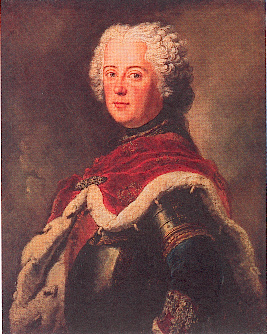

In former times it was no rare thing for a king or emperor to be a composer. Rulers who also composed included Alfonso el Sabio, King of Castile, Thibault IV, King of Navarre, Richard Coeur de Lion and Henry VIII of England, Eric of Sweden, Louis XIII of France and, in uninterrupted succession, the Habsburg Emperors Ferdinand II, Leopold I, Joseph I and Karl VI.
Frederick II - Frederick the Great - of Prussia shared the musical gifts of his sisters Wilhelmine and Anna Amalia. His court musical establishment, whose members included such prominent musicians as C. P. E. Bach, J. J. Quantz, C. H. Graun and F. Benda, was for a time a centre of German musical life. After early years of great promise, signs of stagnation and conservatism soon became evident. There were several reasons for this: the state duties which prevented Frederick from devoting so much of his attention to music as he had previously, the tendency of many court musicians to get into a rut and ignore progress elsewhere, and the over-emphasis placed at Frederick's Court on purely instrumental music with flute (Quantz composed 296 flute concertos for the King!).
Frederick the Great himself is known to have composed 121 flute sonatas, four flute concertos, a "Symphony" in G major, a March in E flat major, various arias, and an overture to "Il Re pastore." Apart from the wholly Italianate arias, Frederick's works were written in the "mixed style" advocated by Quantz, an attempt to blend "Italian music of the senses" with "French music of reason". Remnants of baroque pathos are also intermingled with galant and "touching" elements. The three-movement sonatas are generally in the sequence slow - quick - quick, while the concertos are in the more customary form quick - slow - quick. The slow movements are characterized by "controlled singing." "If the first Allegro is serious, the last can be gay" (Quantz). In the fast movements of the concertos the solo episodes blossom in ever more brilliant arpeggios and passage work.
Frederick the Great is said to have played his instrument "respectably". His execution of slow movements was highly praised, but in fast movements he is said to have been apt to take undue liberties with the tempo.
The Composers
- Johann Friedrich Agricola
- Carl Philipp Emanuel Bach
- Franz [Frantisek] Benda
- Georg (Anton) [Jirí Antonin] Benda
- Carl Friedrich Christian Fasch
- Carl Heinrich Graun
- Johann Gottlieb Graun
- Johann Gottfried Müthel
- Christoph Nichelmann
- Johann Joachim Quantz
Supplemental Materials
Poetry and Prose
Articles